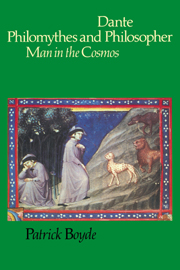Summary
Usque ad elementa
let us return to the opening of aristotle'sPhysicsand the sentence to which Dante refers in the De vulgari eloquentia: ‘We think we know something when we know its primary causes and first principles right back to its elements’; (… cum causas primas et prima principia cognoscimus, et usque ad elementa). In the previous chapter we treated the three nouns here as roughly synonymous and concentrated on the meaning of the word cause. We must now try to distinguish them one from another and focus on the word element.
In his own little dictionary of the most important philosophical terms, Aristotle points out that in ordinary usage the word ‘element’ belongs with the concept of ‘material cause’. It refers to the ‘cause out of which’, and as such it must always be immanent in the thing of which it is predicated: no one would call a potter the ‘element’ of his pot. On the other hand, ‘element’ is not a synonym for ‘material cause’. We do not speak of bronze as the ‘element’ of a bronze statue, because we know that it is an alloy of copper and tin; and, by the same token, we do not speak of potter's clay as the element of a pot. An element must be the first and simplest constituent. It must be capable of independent existence (unlike the abstraction ‘primary matter’); but it cannot be resolved or divided into other simpler species.
- Type
- Chapter
- Information
- Dante Philomythes and PhilosopherMan in the Cosmos, pp. 57 - 73Publisher: Cambridge University PressPrint publication year: 1981



